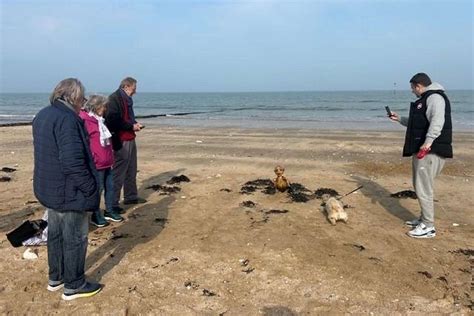
Bizarre and disturbing debris, including medical waste and what appear to be prison identification cards, has washed ashore along several beaches in South Florida, sparking outrage among residents and raising serious concerns about pollution and potential health hazards. The unsettling discoveries, documented in detail by local news outlets and concerned citizens, have prompted calls for immediate investigation and remediation efforts.
Residents are expressing anger and disbelief after encountering the unusual items littering the coastline. The objects found range from seemingly innocuous plastic refuse to materials that suggest a systemic failure in waste management protocols. The specific locations impacted include beaches in and around West Palm Beach, where the concentration of unusual debris appears to be highest.
The discovery of medical waste, potentially including syringes, vials, and other biohazardous materials, is particularly alarming. Health officials are urging beachgoers to exercise extreme caution and to avoid direct contact with any suspicious items. The origin of the medical waste remains unclear, but theories abound, ranging from improper disposal by healthcare facilities to illegal dumping at sea. The presence of such materials poses a direct threat to public health and necessitates immediate action to identify and eliminate the source of contamination.
Adding to the unease are the reported findings of what appear to be identification cards linked to correctional facilities. These cards, if authentic, suggest a possible connection to prison waste management practices or, more concerningly, the deliberate disposal of sensitive materials. The implications of such a discovery are significant, raising questions about security protocols and the accountability of institutions responsible for managing potentially sensitive information. Law enforcement agencies have been alerted and are reportedly investigating the matter.
The incident has triggered a wave of social media activity, with residents sharing images and videos of the debris. The hashtag #FloridaBeachDebris has become a rallying point for those demanding answers and action. Local environmental groups are organizing clean-up efforts and advocating for stricter regulations on waste disposal.
The Florida Department of Environmental Protection has acknowledged the reports and announced plans to conduct a comprehensive assessment of the affected areas. The agency has pledged to work with local authorities and relevant stakeholders to identify the source of the debris and to implement appropriate measures to prevent future occurrences.
“We are taking these reports very seriously,” said a spokesperson for the Florida Department of Environmental Protection in a released statement. “Our top priority is to protect public health and the environment. We will conduct a thorough investigation and take all necessary steps to address this issue.”
The incident serves as a stark reminder of the challenges facing coastal communities in managing waste and protecting marine environments. The long-term impact of pollution on marine ecosystems is well-documented, and the recent discoveries underscore the urgent need for improved waste management practices and stricter enforcement of environmental regulations.
The potential economic consequences of the beach debris are also a major concern. Florida’s tourism industry is heavily reliant on clean and pristine beaches. The presence of medical waste and other debris could deter tourists and negatively impact the local economy. Business owners in the affected areas are already reporting a decline in beach traffic.
The discovery also raises questions about the role of international waste disposal practices. With Florida’s proximity to international shipping lanes, it is possible that some of the debris originated from vessels traveling through the region. Investigating the potential involvement of international sources will be a key part of the ongoing investigation.
The situation highlights the interconnectedness of global environmental issues. Pollution knows no borders, and the actions of one country can have significant consequences for others. Addressing the problem of marine debris requires international cooperation and a commitment to sustainable waste management practices.
Moving forward, it is crucial that authorities conduct a transparent and thorough investigation, communicate effectively with the public, and implement long-term solutions to prevent future occurrences. The health and well-being of coastal communities, as well as the integrity of the marine environment, depend on it. This incident serves as a wake-up call, demanding immediate and sustained action to protect Florida’s beaches and coastal resources. The state’s reputation as a premier tourist destination is at stake, and the long-term environmental consequences could be devastating if the issue is not addressed promptly and effectively.
The current situation also brings into focus the broader issue of plastic pollution in our oceans. Plastics make up a significant portion of marine debris, and they can persist in the environment for hundreds of years. Reducing our reliance on single-use plastics and improving recycling rates are essential steps in addressing this global problem.
The Florida Fish and Wildlife Conservation Commission (FWC) is also involved in the investigation, focusing on the potential impact of the debris on marine life. Animals can become entangled in plastic debris, ingest harmful toxins, and suffer other negative consequences. Protecting marine wildlife is a critical aspect of environmental stewardship, and the FWC is working to assess the extent of the damage and to implement measures to mitigate the impact on vulnerable species.
The long-term effects of this incident remain to be seen. However, one thing is clear: the discovery of medical waste and other unusual debris on Florida’s beaches has sparked outrage and raised serious questions about waste management practices, environmental protection, and the health of our oceans. The response to this crisis will be a defining moment for Florida, testing its commitment to environmental stewardship and its ability to protect its valuable coastal resources.
The Environmental Protection Agency (EPA) has been notified and is monitoring the situation. The EPA’s involvement underscores the seriousness of the issue and the potential for federal intervention if necessary. The agency has the authority to enforce environmental regulations and to provide technical assistance to state and local governments.
The situation is further complicated by the upcoming hurricane season. Storms can exacerbate the problem of marine debris by washing more trash ashore and spreading contaminants over a wider area. Preparing for hurricane season will require a coordinated effort to remove existing debris and to prevent future contamination.
The local communities are stepping up to address the crisis. Volunteer groups are organizing beach cleanups, educating the public about the dangers of marine debris, and advocating for stronger environmental regulations. Their efforts are a testament to the resilience and dedication of the people who call Florida home.
The incident also highlights the importance of public awareness and education. Many people are unaware of the extent of the marine debris problem and the impact it has on the environment. By raising awareness and promoting responsible waste disposal practices, we can all play a role in protecting our oceans and beaches.
The Florida legislature is considering new legislation to address the problem of marine debris. The proposed laws would increase penalties for illegal dumping, strengthen regulations on waste management, and provide funding for cleanup efforts. The outcome of these legislative efforts will be crucial in determining the state’s long-term response to the crisis.
The incident serves as a reminder that environmental protection is not just the responsibility of government agencies and environmental groups. It is a shared responsibility that requires the participation of individuals, businesses, and communities. By working together, we can protect our oceans and beaches for future generations.
“This is a wake-up call for all of us,” said Maria Rodriguez, a local environmental activist. “We need to take action now to protect our beaches and our oceans. We cannot afford to wait any longer.”
The situation is evolving rapidly, and new developments are likely to emerge in the coming days and weeks. Stay tuned for updates as the investigation unfolds and as authorities work to address this pressing environmental crisis. The community’s involvement, coupled with stringent governmental actions, will be pivotal in restoring the sanctity of Florida’s beaches and safeguarding its ecological future. The incident underscores a critical need for vigilance, proactive waste management strategies, and robust environmental protection measures to prevent future occurrences and ensure the well-being of both the ecosystem and the communities that depend on it. The collaborative efforts of residents, environmental groups, and governmental bodies are crucial in addressing this challenge effectively and preventing similar incidents in the future.
The ongoing cleanup efforts are being hampered by the sheer volume of debris and the difficulty of identifying its sources. The investigation is focusing on potential sources both on land and at sea, including illegal dumping sites, wastewater treatment plants, and shipping vessels. The use of advanced technologies, such as drones and satellite imagery, is being considered to map the extent of the debris field and to identify potential sources.
The economic impact of the beach closures is also being assessed. Local businesses that rely on tourism are already feeling the pinch, and the long-term effects could be significant. The state government is considering providing financial assistance to businesses affected by the closures.
The psychological impact of the incident on residents is also being taken into account. Many people are feeling anxious and concerned about the safety of their beaches and the health of their environment. Counseling services are being made available to those who need them.
The incident is also raising questions about the effectiveness of existing environmental regulations. Some critics argue that the regulations are too weak and that enforcement is lax. They are calling for stronger regulations and more aggressive enforcement to prevent future incidents.
The Florida Department of Health is issuing advisories to beachgoers, urging them to avoid contact with any suspicious materials and to report any sightings of debris to the authorities. The department is also providing information about the potential health risks associated with exposure to medical waste and other contaminants.
The incident is being compared to other similar incidents that have occurred in other parts of the world. Experts are studying these incidents to learn lessons and to develop best practices for preventing and responding to marine debris events.
The Florida Keys National Marine Sanctuary is also being monitored for any signs of debris. The sanctuary is a fragile ecosystem that is particularly vulnerable to pollution. Protecting the sanctuary is a top priority.
The incident is also prompting a broader discussion about the need for sustainable development. Sustainable development is development that meets the needs of the present without compromising the ability of future generations to meet their own needs. It requires a balance between economic growth, social equity, and environmental protection.
The incident is a stark reminder that our actions have consequences. We all have a responsibility to protect our environment and to ensure that future generations can enjoy the same benefits that we do.
The investigation is ongoing, and authorities are urging anyone with information about the incident to come forward. Tips can be submitted anonymously to the Florida Department of Environmental Protection.
Frequently Asked Questions (FAQ)
1. What kind of debris has been found on the beaches?
The debris includes medical waste (potentially syringes and vials), various plastics, and what appear to be identification cards from correctional facilities. The specific nature of the medical waste and the authenticity of the identification cards are under investigation.
2. Which beaches are affected by the debris?
Beaches in and around West Palm Beach, Florida, appear to be the most heavily affected, but reports indicate debris washing ashore on other South Florida beaches as well. Authorities are still assessing the full extent of the affected areas.
3. What are the potential health risks associated with the debris?
Medical waste poses a significant health risk due to the potential for exposure to pathogens and contaminants. Beachgoers are advised to avoid contact with any suspicious items and to report them to authorities immediately. Other debris, such as plastics, can pose entanglement hazards to marine life and contribute to broader environmental pollution.
4. What is being done to address the situation?
The Florida Department of Environmental Protection is conducting a comprehensive assessment and working with local authorities to identify the source of the debris. Cleanup efforts are underway, involving both governmental agencies and volunteer groups. Law enforcement is investigating the origin of the potentially sensitive documents, such as the correctional facility identification cards. The EPA has also been notified and is monitoring the situation.
5. How can I help?
Individuals can help by avoiding contact with any suspicious debris on the beach and reporting it to authorities. Participating in organized beach cleanups, reducing reliance on single-use plastics, and advocating for stronger environmental regulations are also effective ways to contribute to the solution. Staying informed about the latest developments and sharing accurate information with others can also help raise awareness and promote responsible behavior.
6. What are the authorities doing to identify the source of the debris?
The investigation involves examining potential sources on land and at sea, including illegal dumping sites, wastewater treatment plants, and shipping vessels. Advanced technologies like drones and satellite imagery are being considered to map the debris field and identify potential source points. Law enforcement is also investigating whether the correctional facility identification cards are authentic and how they ended up in the ocean.
7. What is the economic impact of the beach debris?
The presence of medical waste and other debris could deter tourists and negatively impact the local economy, which is heavily reliant on clean and pristine beaches. Business owners in the affected areas are already reporting a decline in beach traffic. The state government is considering providing financial assistance to affected businesses.
8. What is the Florida Department of Health advising beachgoers?
The Florida Department of Health is issuing advisories to beachgoers, urging them to avoid contact with any suspicious materials and to report any sightings of debris to the authorities. The department is also providing information about the potential health risks associated with exposure to medical waste and other contaminants.
9. What is the long-term impact of this incident on the environment?
The long-term effects of this incident remain to be seen. However, the discovery of medical waste and other unusual debris on Florida’s beaches has sparked outrage and raised serious questions about waste management practices, environmental protection, and the health of our oceans. The response to this crisis will be a defining moment for Florida, testing its commitment to environmental stewardship and its ability to protect its valuable coastal resources.
10. What actions are being considered at the legislative level to address marine debris?
The Florida legislature is considering new legislation to address the problem of marine debris. The proposed laws would increase penalties for illegal dumping, strengthen regulations on waste management, and provide funding for cleanup efforts. The outcome of these legislative efforts will be crucial in determining the state’s long-term response to the crisis.









